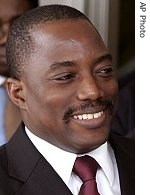Vital Kamerhe, a former minister and secretary-general of President Kabila's People's Party for Reconstruction and Development, was elected president of the National Assembly by an overwhelming margin. Kamerhe said his victory showed he was not only the candidate of Kabila's Alliance of the Presidential Majority, but was supported by everyone. The Alliance of the Presidential Majority won 332 of 500 seats in the legislative body in July parliamentary elections that were part of Congo's first democratic polls in more than 40 years. Thirty-two candidates initially competed for seven National Assembly posts. Pro-Kabila MPs took six of the posts, with the remaining position to be decided in a second round of voting. The opposition said the majority coalition had changed parliamentary bylaws to give itself more control over key commissions, and should have left some leadership posts to the minority group. But Kamerhe said he was just allowing democracy to run its course and promised to work with the opposition. The new parliament replaces a body of appointed government supporters, rebels, and civil society members, which helped run Congo during the three-year transition period following the country's 1998-2003 war. Kamerhe said the lawmakers will begin their work as soon as a prime minister is chosen and a new government is formed. President Kabila was sworn in earlier this month, promising to unify the country divided during the six-year conflict that saw an estimated four million Congolese die, mainly from starvation and disease.
A close adviser to Congolese President Joseph Kabila has won the top leadership position in the Democratic Republic of Congo's newly elected parliament. Joe Bavier is in the capital, Kinshasa, and has more for VOA.

Joseph Kabila (file photo)
Related articles
- • Felix Tshisekedi Sworn In as DR Congo President (January 24, 2019)
- • Constitutional Court Declares Tshisekedi Winner of Presidential Election (January 19, 2019)
- • Felix Tshisekedi Vows to Be the President of All Congolese (January 10, 2019)
- • Felix Tshisekedi Elected DR Congo President (January 10, 2019)
- • DR Congo Delays Results of December Election (January 6, 2019)
- • Bemba, Katumbi renew their support for joint opposition presidential candidate Fayulu (November 16, 2018)
- • Vital Kamerhe also withdraws support for joint opposition presidential bid (November 12, 2018)
- • Oppositioin leaders pick Martin Fayulu as joint presidential candidate (November 11, 2018)
- • Jean-Pierre Bemba banned from running for president (August 25, 2018)
- • Vital Kamerhe named UNC presidential candidate (August 4, 2018)
- • Botswana Urges Joseph Kabila to Step Down (February 26, 2018)
- • No elections in DR Congo in December without electronic voting machines: INEC (February 13, 2018)
- • US Warns DR Congo Against Electronic Voting for Delayed Election (February 12, 2018)
- • Felix Tshisekedi accuses INEC of illegally prolonging Kabila's mandate (October 24, 2017)
- • DRC Seeks Arrest of Presidential Candidate Moise Katumbi (May 19, 2016)
- • Papa Wemba Is Buried in Kinshasa (May 4, 2016)
- • Papa Wemba Awarded Highest National Honor as Thousands Pay Tribute (May 2, 2016)
- • Rights Groups: DR Congo Must Free Pro-democracy Activists (April 13, 2015)
- • Police Open Fire on Crowd Protesting Election Law Change (January 19, 2015)
- • Etienne Tshisekedi Evacuated to Belgium for Medical Treatment (August 16, 2014)
- • Kerry Calls on Kabila to Honor Constitution (May 4, 2014)
- • Kerry in DR Congo for Security Talks (May 3, 2014)
- • DR Congo Takes Chairmanship of COMESA at Summit in Kinshasa (February 26, 2014)
- • DR Congo Honors Nelson Mandela, Hero and Model for Humanity (December 6, 2013)
- • Kabila Congratulates Congo Army for Defeating M23 Rebels (October 30, 2013)
- • DR Congo Eases Process for Starting a New Business (June 3, 2013)
- • Regional Leaders Sign DR Congo Peace Deal (February 24, 2013)
- • The M23 Rebels Want to Overthrow Kabila? Nonsense (November 28, 2012)
- • Protests Against M23 Rebels, Government and UN Spread (November 22, 2012)
- • Thousands Protest M23 Capture of Goma, Turn on Government and UN (November 21, 2012)







